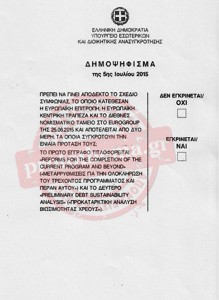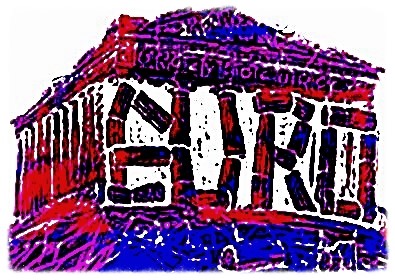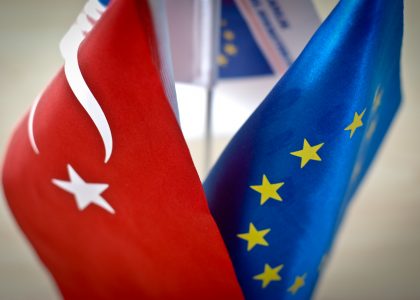Dr. Vassiliki N. Koutrakou argues that Greek people should not act instinctively in forthcoming referendum.
As the emergency referendum on the last ditch EU-IMF Greek rescue plan looms, it has never been more urgent for the Greek people to try to reflect soberly, rather than instinctively, on the desperate situation the country is in, and vote in favour of staying on the stony, yet steady, path of slow recovery inside the eurozone, assuming it is still available, rather than opt for disastrous default, self-exile and perpetual marginalisation and backwardness.
Myths, slogans, misinformation and brinkmanship have put pragmatism, sense and responsibility in the shadow for far too long in Greece.
Granted, the people are suffering, austerity measures have hit hard, particularly those least deserving of punitive measures, and the Troika’s handling of the debt crisis has had its faults as it tried to find a way out of the economic quagmire that revealed itself in several EU countries since the global financial crisis, through a degree of trial and error policies. This has led to an endless blame game on all sides.
Time is pressing though and it is finally important to restore a sense of perspective, resist pointless venting and visceral lashing out through the proliferation of myths, and act responsibly ahead of this precipice.
It is not the European Union which landed Greece in this massive debt. It is not the hard-working salaried public and private sector employees, with their transparent finances, who have seen their pay cut and working conditions dramatically worsened in recent years or even lost their jobs altogether with no realistic hope of finding new ones in the near future. It is not the pensioners who worked a lifetime and prudently saved and topped-up their pensions to secure their twilight years and who have now seen those pensions brutally slashed, who are to blame. It is not the prudent savers who trusted government bonds only to lose them overnight that caused the crisis.

Image Source: http://www.protothema.gr/politics/article/488809/auto-einai-to-psifodeltio-tou-dimopsifismatos-tis-5is-iouliou/
It is chronic mismanagement of the country’s finances by criminally irresponsible past governments which broke the back of the country’s economy. Even today, former leaders like the late Prime Minister Andreas Papandreou are considered ‘sacred cows’ in the ideological mythology which dominates Greek politics, with no one daring to criticise them publicly. Yet it is those ‘untouchable’ former leaders of PASOK but also New Democracy and their entourages who are the chief culprits of misappropriating billions of Greek taxpayers’ money and just as many of the huge EU structural funds which have been poured into Greece over the years. It is they who became filthily rich, systematically conjuring up jobs for the loyal party activists and distributing short-termist handouts to voters, while delivering meagre proportions of the promised public works which these public finances were earmarked for.Ever since Greece’s entry into the European Community in 1981, successive Greek governments can be described as nothing short of institutionally corrupt, incompetent, or both.
Furthermore, they consciously compounded their culpability by covering up, passing laws of immunity from prosecution for acting MPs and introducing short statutes of limitations beyond which time-limits courts would no longer be able to pursue claims of wrong-doing. This climate of impunity persists to the present day, with only a token few former politicians, like the former defence minister Akis Tsohatzopoulos being brought to justice, while the vast majority remaining untouched and the enormous amounts of public finances they frittered away unrecouped. However, irresponsible behaviour contributing to the present crisis is not solely the privilege of those few in power in Greece. Since membership of the EU, the credit culture, previously unknown in the country, has led to an upward spiralling of borrowing at individual level, for all the trappings of an increasingly consumerist society, from modern homes and cars to luxury goods and holidays. The lifestyle of Greeks, particularly in urban centres, blossomed, chiefly as a result of EC aid and uncontrolled borrowing from banks.
At the same time as the sense of ‘entitlement’ to a good life became entrenched, productivity in a country which relies mainly on seasonal agricultural produce and tourism, did not and could not match the pace of consumption. If anything, EU agricultural aid, for all its benefits, encouraged complacency. Adding to this, systematic tax evasion, right across the income ladder, from businesses and highly paid lawyers and doctors, to plumbers, electricians, farmers and taxi-drivers, crippled public finances. The final straw, seasonal employment and business creation in the tourist industry, with some working for seven months of the year and ‘shutting up shop’ and ‘putting their feet up’ for the remaining five months, and the widespread abuse of the right to strike creating a constant and unjustified culture of daily protests, strikes and demonstrations for assorted – often nonsensical – trumped up demands dressed up in ideological labour struggle slogans, disrupted all possible notion of stability of market and production, and brought the economy to its knees.
Given the above, it is no wonder that international markets, business partners, investors, international organisations and EU institutions, as well as fellow member states, have lost all trust in Greece’s credibility and exact stringent conditions and high guarantees for loans. It is not they that ‘humiliate’ the country; it is its own record and the picture it presents. In the face of this, electing SYRIZA to government, with its arrogant rhetoric and populist but ill-thought anti-austerity agenda, offering nothing but unrealistic visions and no viable alternatives, destroyed even the few faint green shoots of recovery which just were beginning to emerge. On a public consumption diet of national pride and dignity propaganda, cultivated by the media, coupled with a collective disregard of the fact that for wealth to exist it must be earned not handed out, as well as the government’s catastrophic diplomatic mishandling characterised by bluffing and reckless and conceited brinkmanship, and abandoning negotiations when they should be the last to leave the table, the country has once more been set back dramatically, alienating and exasperating its partners more than ever before, bringing it to an existential precipice. Brinkmanship is valid when one can afford it; even mighty Russia bowed its head in the post-Cold War era, swallowing its pride and refraining from asserting itself, on issues vital to its interests such as foreign policy in the Middle East and the Yugoslavian break-up, while it was crucially financially dependent on western aid for its economic reconstruction and transformation, only to re-emerge assertively on the international scene, once it had ensured viable alternatives, assuring it of relative financial self-reliance.
And so the Greek people find themselves before another, perhaps the ultimate, crossroads. To vote yes to a 12bn euro extended-bailout plan, after the expiration of its deadline. With the run on the banks having shut down banking and stockmarket, the Greek people must stop and exercise that rarest of things, self-criticism and self-restraint, admitting and accepting the tough austerity road ahead, continually striving to reform the country’s ills and to negotiate the evening out of its harshest or unfair aspects from the inside, or venturing into the abyss of a GREXIT and default, with new and cumbersome exchange rates, no Eurozone cushioning, no proposed alternatives, no credibility in the international markets, stone-walled by international lenders and investors. Anyone who has been forced down the road of bankruptcy knows well that the world of creditless ‘wilderness’ is no picnic.
Those deeply saddened to see a country with a proud history such as Greece in this position, should surely advise, even the hardest and most cruelly hit Greeks, to conduct themselves with extreme caution, self-discipline and to show maturity, humility, sense and responsibility, and to refrain from succumbing to vacuous, populist nationalism, knee-jerk outrage, or aimless desperation, at this crucial time, and take the pragmatic route of short-term pain of reform and hardship, in favour of the longer, and more promising view that can be achieved in, not outside, the European family of nations.
Dr. Vassiliki N. Koutrakou is the Director CREST, (Centre for Research in European Studies), University of East Anglia.






2 thoughts on “A Plea to Greek People for Sense and Responsibility”